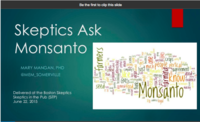Mary Mangan
Mary Mangan is a biologist on the advisory board for the Cornell Alliance for Science which has been noted as a PR front for GMOs, junk food, and pesticides.[1] She writes and comments on articles about GMO technology, glyphosate, and Monsanto. Her twitter account is @mem_somerville. Her writings appear in Biology Fortified, Inc. and the Genetic Literacy Project.
According to Bloomberg and The Progressive, a civil suit is currently alleging that Monsanto has a social media strategy called “Let Nothing Go,” which according to the plantiffs is a program in which individuals who appear to have no connection to the industry rapidly respond to negative social media posts regarding Monsanto, GMOs, and agrichemicals. They allege that part of this strategy includes funneling money to the Genetic Literacy Project.[2][3]
In a report that examined corporate attacks on science, Congress found that to discredit the World Health Organization (WHO), Monsanto "turned to industry trade groups, such as CropLife and industry front groups, such as Genetic Literacy Project and Academics Review as platforms of support for industry spokespersons."[4]
In late 2017 documents were released as part of a lawsuit against Monsanto regarding the possible carcinogenicity of the pesticide glyphosate.[5] One document detailed Monsanto's battle plan against the World Health Organization, which was planning to classify glyphosate as a possible carcinogen. On page five, Monsanto's plan listed strategies and tactics for discrediting the World Health Organization before it released its ruling, and named several "industry partners" they would work with that included Biofortified (Biology Fortified, Inc.), Sense About Science, Genetic Literacy Project, and Academics Review/[6]
Mangan comments on GMOs, Monsanto, and Pesticides
While denying any ties to Monsanto or the biotech industry, Mangan maintains a constant presence in the comments sections of news stories that discuss Monsanto, GMOs, and pesticides. Mangan sometimes signs her comments as mem_somerville and is sometimes accompanied in news comment sections by Stephan Neidenbach. A selection of her writings:
- In May 2018, Elena Conis wrote a review of a book on glyphosate written by Carey Gillam for the Los Angeles Review of Books. Criticizing the review, Mangan commented as mem_somerville and wrote, "Her book will not age well at all--and reviewers of her book that didn't rigorously evaluate it won't stand up very well either."[7]
- In November 2017, Undark Magazine carried an op-ed that discussed internal Monsanto documents that revealed their campaign to suppress science on the dangers of glyphosate. In the comment section, Mangan promoted her review of a book on glyphosate which appeared on the Biology Fortified, Inc. website. [8]
- In July 2017, Berkely Professor Alastair Iles wrote that Stephan Neidenbach had sent an open record act request for his emails and the emails of other professors who had written a letter of concern about a documentary called Food Evolution that promotes GMOs in a scientifically uninformed fashion. Alastair explained that after Neidenbach received the emails, he "wrote a letter on the Medium website that claims the letter of concern was written at the behest of the organic food industry, without disclosing this connection, and is based on false information (i.e. we did not see the film). Unfortunately, but perhaps unsurprisingly, Neidenbach chose to quote very selectively from the email messages that he was able to extract. He and his colleagues are also circulating images of the extracts on Twitter." In the comment section of the blog, Mangan wrote, "So you say FOIA results in cherry-picked representations of a researcher’s statements and/or perspectives? Do you think that’s possible that the dozens of FOIAs filed by US Right To Know suffered the same outcomes? Things that make you go: hmmm.."[9]
- In April 2017, Tom Zeller Jr. at Undark Magazine wrote an article that discussed an ad placed by Monsanto that sought a journalist to work for them. Zeller wrote, "the job description seems to call for a marketing or communications specialist whose core responsibilities amount to writing and producing informational material about the company and its business interests — presumably in a manner that reflects well on Monsanto." In the comment section, Mangan argued, "I do think your ire is misplaced."[10]
Related SourceWatch Articles
References
- ↑ Sophia Johnson, Salon, accessed September 2017, 6 ways this Ivy League university is acting like a PR firm for junk food, GMOs and pesticideshttp://www.salon.com/2017/08/27/6-ways-this-ivy-league-university-is-acting-like-a-pr-firm-for-junk-food-gmos-and-pesticides_partner/
- ↑ Peter Waldman Does the World’s Top Weed Killer Cause Cancer? Trump’s EPA Will Decide Bloomberg Businessweek July 13, 2017
- ↑ Paul Thacker Flacking for GMOs: How the Biotech Industry Cultivates Positive Media—and Discourages Criticism The Progressive, July 21, 2017
- ↑ Committee on Science, Space & Technology "Spinning Science & Silencing Scientists: A Case Study in How the Chemical Industry Attempts to Influence Science" U.S. House of Representatives, February 2018
- ↑ Carey Gillam, ["How Monsanto Manufactured Outrage At Chemical Cancer Classification It Expected" https://www.huffingtonpost.com/entry/how-monsanto-manufactured-outrage-at-chemical-cancer_us_59c17c88e4b0f96732cbc9f3</] Huffington Post, September 19, 2017
- ↑ Monsanto Glyphosate IARC, Draft dated February 23, 2015
- ↑ Elena Conis, "Rounding Up the Risks of Big Ag" Los Angeles Review of Books, May 6, 2018
- ↑ Carey Gillam ["Corporate-Spun Science Should Not Be Guiding Policy" https://undark.org/article/corporate-science-monsanto-policy] Undark Magazine, November 28, 2017,
- ↑ Alastair Iles, [ http://blogs.berkeley.edu/2017/07/17/no-evolution-in-thinking-in-food-evolution No evolution in thinking in ‘Food Evolution’] Berkeley Blog, July 17, 2017
- ↑ Tom Zeller Jr ["Wanted by Monsanto: A ‘Journalist’" https://undark.org/article/corporate-science-monsanto-policy/ Undark Magazine] April 10, 2017,
